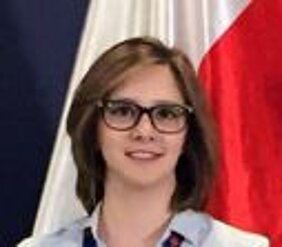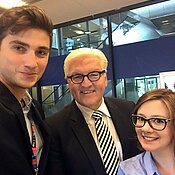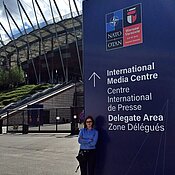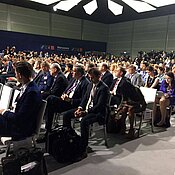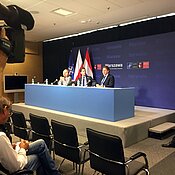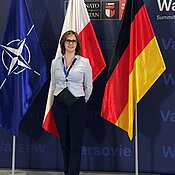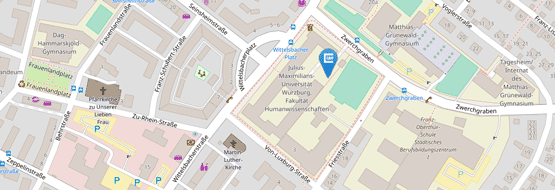Vom IPS zum NATO-Gipfel in Warschau: Eine Erasmusstudentin berichtet
23.07.2016Vor knapp zwei Wochen blickte die Welt nach Warschau, wo sich im Nationalstadion Verteidigungspolitiker, Staats- und Regierungschefs zum diesjährigen NATO-Gipfel trafen. Katarzyna Nowicka, Teilnehmerin der Summer School German Politics im Sommer 2015 und seit dem Wintersemester 2015/16 Erasmusstudentin am IPS, bewarb sich als studentische Helferin beim Veranstaltungskomitee und hoffte auf ihre Chance, Weltpolitik aus nächster Nähe erleben zu können.
Nach einem intensiven Auswahlprozess und einigen Lehrgängen, für die sie im Laufe des Semesters zwischen Würzburg und Warschau pendelte, durfte Nowicka Anfang Juli dann als freiwillige Helferin mitwirken. Für uns berichtet sie von ihrem Weg zum NATO-Gipfel, Selfies mit Barack Obama und Gespräche mit Frank-Walter Steinmeier.
Closer to the World Leaders
My experience as a Volunteer at the Warsaw NATO Summit
Katarzyna Nowicka
How often in our regular student’s life do we get involved into something important from an international perspective? We can participate in conferences and simulation sessions, however this kind of events are rather far from the ones strongly affecting international community. Many of us, studying Political Sciences or International Relations, dream of having discussion with the politics of the highest importance. Even a few words exchange or a handshake would be enough. Such opportunities, open to every student, can be provided by a volunteer service at international sessions and summits. Two weeks ago I had a chance to experience it firsthand as a volunteer at the Warsaw NATO Summit.
First, the application process connected with paperwork and waiting for a response: After a few weeks we got an invitation for an interview. There was a commission verifying the reliability of our application, investigating qualification, suitability as well as level of language proficiency (knowledge of at least two foreign languages was required). After another few weeks we luckily got a call for preparatory training – and then came relief and satisfaction of obtaining a favorable decision. In a nutshell, this is how I can describe the recruitment process.
I observed as for two days the Warsaw National Stadium had changed into the venue for NATO Summit meetings of Heads of State and Government. The main pitch was the center point of the event. The rest of the stadium was divided into two parts – the western part was designed exclusively for the delegations, while the eastern part was put at journalists’ disposal. The eastern part included the most important International Media Center with a size of approximately 10,000 m², where my work was assigned.
Volunteer work, as usual, consisted of performing simple organizational tasks under the supervision of MFA staff. From serving in hotels and information points, through issuing accreditation passes, to preparing briefing rooms, interview corners and Main Press Theatre. The last mentioned posed the greatest chance for meeting delegates, but not only this one. After working hours we could move freely inside the stadium zones available for journalists. Access to the session room was of course forbidden. However, when the delegates left it going to the hand shake, family photo or their lounge, we had an opportunity to come into face to face contact, take a photo, and sometimes exchange a few sentences. This way I was able to shake hands with Frank-Walter Steinmeier, Bert Koenders, and take a selfie with Barack Obama.
Describing the Summit I cannot ignore the incredible work of soldiers, military police, border guards and police, who made the Warsaw Stadium became a fortress impossible to conquer. Getting to the stadium was quite a challenge, even for the MFA personnel. To enter the area surrounding the stadium one had to identify himself, and then go through the control not different from the one at the airport. Just before entering the stadium, one had to identify himself again, and inside also a few times. The rule was simple – the closer to delegates, the more control it required. I really cannot count how many times I was checked in one day despite wearing my pass on top.
The organizers took care not only about the safety at the stadium, but also about us, the volunteers. While the entire city center was blocked and transport was very difficult, we could move with the shuttle buses, which traveled directly from journalists’ hotels. In addition, we were the owners of Warsaw Card, which allowed us to use public transport for an entire week for free. Hot meal and a few souvenirs were also included.
The only downside was that we needed to work mostly during the media conferences, so only little information reached us. I must admit that I learned about most of the decisions and statements from media like everybody else. Nevertheless, this work, while a few meters away decisions of global importance were made, gave me the spirit that I was a part of something really significant, and therefore brought a lot of satisfaction. I recommend it to everyone who values experiences more than financial gain. Because in the end, how would you price the opportunity of seeing world leaders with human faces, without artificial smiles and trained poses?


